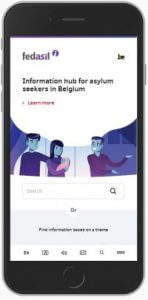Fedasil info: the platform with useful and practical information for asylum seekers. 150 pages in 12 languages; Untranslate efficiently provided a quality translation.
At the end of last year, Fedasil launched a multilingual and intuitive website: that provides asylum seekers with reliable information about 8 different issues: asylum and procedure, finding a home, living in Belgium, returning, working, unaccompanied minors, health and learning. The platform is also accessible by mobile browser and represents a major improvement on the past, when most of the information for asylum seekers was only available on paper. These paper brochures and flyers often contained information that was difficult to understand, which was written at near-university level. The specific target group is not easy to reach, however, and prefers to read the texts in their own language. The new site contains information in 12 languages, and has a glossary explaining difficult concepts. You can also choose to have the texts read out loud.
Preliminary research
Before starting, the needs of the target group were identified. It turned out that the majority of asylum seekers own a smartphone, prefer to look up information online, and regularly share information with fellow countrymen. However, there was a lot of incorrect information circulating in closed groups on Facebook or WhatsApp. People smugglers also have an influence, which reduces the confidence asylum seekers have in the government.
Sofie Watté, project leader for Information for Asylum Seekers, tells us this about the research: ‘We thought it was very important to involve our target group from the start. What information do they look for, when and where do they look it up, and what are their specific needs? The insight we gained really helped us structure the different topics, which is reflected in the current architecture.’
The preliminary research also led to guidelines for the writing: the texts needed to be as accessible as possible. A glossary, supplemented with keywords in the target language of the target group, ensures anyone can understand the information. Even a simple word like ‘learning’ can have different meanings: is it about starting to study, teaching someone, or maybe something else? Since it is customary in some languages and cultures to address young people less formally, separate translation workflows were undertaken during the translation process to take the tone of voice for the target group into account.
Mobile
Because the website is primarily intended for mobile users, the content is integrated in a different way. The texts are as short as possible, and the information is provided in the form of ‘bullet points’. The research also found that almost everyone has a smartphone, but cannot always work it properly. 10% of asylum seekers are illiterate, which makes audio extremely important. The site also remembers which pages you have already visited, which benefits the user experience.
Translation module
The current website exists in 12 languages: Dutch, French, English, Arabic, Persian, Pashto, Russian, Spanish, Albanian, Turkish, Somali and Tigrinya. The mix of different writing, and the bidirectional writing direction, adds to the challenge for the designers and webmasters. The website also contains a lot of content (more than 150 pages in the source language), so tackling the translation process manually and without the right tools was not an option.
Sofie explains: ‘We soon noticed that there was a lot of work involved in publishing the translation. The pages usually contain different passages, each in a different style. Just think of titles, paragraphs, lists, hyperlinks, and pop-ups with a definition of the term used. A manual approach would have meant that all these pieces of text would need to be entered individually. We thought asking the webmasters to do this in a language they do not understand was a “recipe for disaster”!’
Untranslate advised automation of the translation process. By integrating the Untranslate translation platform and Drupal 8, the CMS behind Fedasil info, each individual text could be sent to translators in manageable packages. Once the translation workflow was complete, including quality control and validation by Fedasil, the translated pages were automatically published in Drupal. For example, Fedasil employees did not have to risk error-prone copying and pasting, or labour-intensive layout work with the resulting 1,800 pages.
Nathalie De Sutter of Untranslate adds: ‘This integrated workflow offers great advantages, especially for multi-lingual websites with a lot of content. You can save a lot of time and be sure that the translated text will end up in the right place. But even after the launch of the website, keeping the content in sync in the different languages is easier: when updates are made in the source, status icons let you see which pages need to be updated and for which languages.’
The website is still a ‘work in progress’ because continuous adjustments and additions are required, such as the numerous communications related to the current corona measures.
Cronos Public Services collaboration
Sofie talks about how the collaboration is going: ‘My experience with Cronos Public Services and their partner company, Untranslate, is that they always work with us to understand our needs. As a result, we now have high-quality translations. We have a very close collaboration, which means we can make changes very quickly. This way, we can follow up on everything immediately, and that creates trust. Untranslate supports our employees with demos and documentation. Moreover, the project managers are always ready to answer our technical questions.’
Fedasil has already received an enormous amount of positive feedback: the website is currently visited 12,000 times a month. And not only many asylum seekers, but also social workers find the terminology list to be a useful tool when communicating with their clients. As a result, Fedasil info ensures asylum seekers have access to correct and clear information in various ways.



